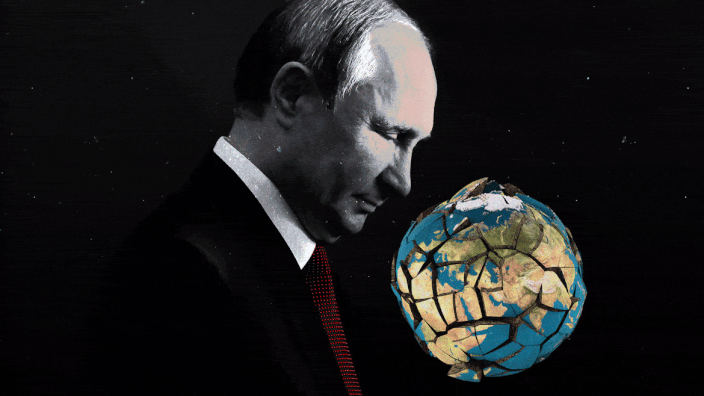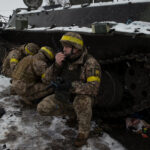
The subject is Putin’s brain.
Is President Putin clinically insane? Is he choreographing madness and threats of a nuclear holocaust to frighten the West? Or does Putin know precisely what he’s doing? The questions are reasonable, but ultimately unanswerable. There is a data point, however. Russian and German scientists at Moscow’s aptly named Research Institute of the Brain in 1925 sliced and diced 30,953 sections of Vladimir Lenin’s cytoarchitecture for indications of genius.
The results of that research remain a mystery, as does a solution to the enigma of whether the heir to Lenin’s throne—one Vladimir Putin—believes his own hype or is experiencing buyer’s remorse over an invasion that caught the rest of the Kremlin unawares.
Sadly, work has not yet begun dissecting Putin’s cerebrum for clues.
Short of delving inside his mind, Fiona Hill, the former Senior Director for Europe and Russia on the U.S. National Security Council during the Trump Administration, did a splendid job of purifying Putin’s sense and sensibility in a recent interview. “Putin is increasingly operating emotionally,” she told Politico. “It’s reestablishing dominance over what Russia sees as the Russian Imperium. We’re treading back through old historical patterns that we said that we would never permit to happen again.”
Rewind about 150 years and you will hear a familiar refrain from Russia’s imperial Romanov family, who spent 300 years brutally persuading their subjects to back endless wars. “If the West is cursing Russia, Russia is doing something right,” blustered the multi-titled Emperor of Russia, King of Congress Poland and Grand Duke of Finland.
To be sure, you really had to be in the audience to feel the full force of tub-thumping late 19th century Tsar Alexander III’s patriotic call to arms but Alexander Romanov is widely believed to be Putin’s favorite tsar. He was assassinated in 1881. A group of young people hurled three bombs at him (without the assistance of TikTok). The Bolsheviks in 1918 murdered the last of the Romanov thoroughbreds in a cellar. The Soviets followed with 69 years of great expectations. The happy drunk and baptized Russian Orthodox Christian Boris Yeltsin became the star of the show in 1991, until Putin took over in 2000.
Still, for the casual visitor, Russia’s memory lane never stretched much further than the gift shop at the Hermitage Museum.
Once upon a time in Moscow, Red Square was an open air market built atop a pavement of logs laid down to cover the mud and keep the tsar’s boots clean and the patriarch’s robe sparkling when they strolled out of the Kremlin. That is the level of reverence Putin has spent the past 22 years resurrecting on state-controlled television for his isolated home audience of 146 million Russian souls.
“Russian politicians excel in making people everywhere believe in things which are not real,” Vladimir Yerofeyev once explained over dinner during my years as a correspondent in Moscow. Yerofeyev should know. He was Joseph Stalin’s translator and no slouch when it came to triggering the trickery Russian leaders use to rally public support to exorcise Western criticism.
The Imperial Kremlin has two masters, one temporal, the other spiritual. The tsar and the Russian Patriarch of All Moscow and All Rus. The tsar and his hierophant-in-chief worked and lived and ruled in tandem. “There’s no difference between the secular realm and the spiritual realm,” explains the Byzantine and Russian historian Henry Hopwood-Phillips. “The tsar and the patriarch are meant to occupy the same body and the same mystical mind. That’s the anvil of Russia’s domestic Byzantine statecraft.”
And Putin’s hammer is wielded by God.
“Let God save the Russian soil,” Putin’s Patriarch Kirill earlier this week on TV told his flock of 90 million devout parishioners. “When I say Russian, I use an ancient expression from the chronicles of where Russian soil started, which includes the Ukraine and Belarus. God forbid,” Kirill thundered, “that the evil forces that have always fought against the unity of Russia and the Russian church get the upper hand in brotherly Ukraine.”
Kirill’s frequent pronouncements in support of Putin’s destruction of Ukraine are not gibberish and, for more Russians than many in the West might want to believe, it’s not lunacy. According to a February 27 poll conducted by Obshestvennoemnenie, 71 percent of the 1,500 respondents said Putin is “working his post rather well” and that they “generally trust him.” Indeed, Russia’s incarcerated opposition leader Alexei Navalny, in a message recently smuggled out of his jail cell, raged against Putin’s primitive melding of the secular and the spiritual to retain miraculous power.
“I will not remain silent watching pseudo-historical nonsense about the events of 100 years ago become an excuse for Russians to kill Ukrainians,” Navalny pleaded. “Let us not become a nation of frightened silent people. Of cowards who pretend not to notice the aggressive war against Ukraine unleashed by our obviously insane czar.”
He is desperately trying to recapture a romanticized heyday.
“Putin looks to be suffering deep melancholy,” reckons Hopwood-Phillips. “His consciousness is still floating in the 17th century, and 44 million Ukrainians are paying the price.”
In Putin’s Russia, nostalgia is what it used to be.
Get the Daily Beast’s biggest scoops and scandals delivered right to your inbox. Sign up now.
Stay informed and gain unlimited access to the Daily Beast’s unmatched reporting. Subscribe now.




